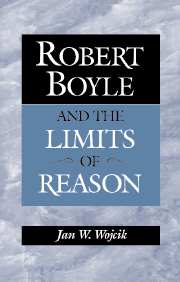Book contents
- Frontmatter
- Contents
- Preface
- Acknowledgments
- Introduction
- Part I The Theological Context
- Part II The Context of Natural Philosophy
- 5 Philosophies of Nature and their Theological Implications
- 6 Sources of Knowledge
- 7 The Limits of Reason and Knowledge of Nature
- 8 Boyle's Voluntarism and the Limits of Reason
- Conclusion
- Bibliography
- Index
8 - Boyle's Voluntarism and the Limits of Reason
Published online by Cambridge University Press: 24 November 2009
- Frontmatter
- Contents
- Preface
- Acknowledgments
- Introduction
- Part I The Theological Context
- Part II The Context of Natural Philosophy
- 5 Philosophies of Nature and their Theological Implications
- 6 Sources of Knowledge
- 7 The Limits of Reason and Knowledge of Nature
- 8 Boyle's Voluntarism and the Limits of Reason
- Conclusion
- Bibliography
- Index
Summary
In A Discourse of Things above Reason, Boyle refused to commit himself to any particular explanation as to exactly why he believed many of the mysteries of Christianity and the secrets of nature to be impervious to human understanding. As I showed in chapter 4, he suggested that the difficulty might be due to our “lapsed state,” or it might be related to the way in which the human soul was united to the human body. But he emphasized neither of these possibilities, being content most of the time to appeal more generally to the incommensurability between the understanding of finite beings and that of an infinite being. A careful study of Boyle's writings as a whole, however, reveals that he believed that God, as creator, had freely and deliberately chosen to limit the rational faculties of human beings (and the rational faculties of angels, as well). In creating the world commensurate with his own infinite understanding and in limiting the rational faculties of created beings, God had deliberately left “human understandings to speculate as well as they could upon those corporeal, as well as other things.”
Boyle's belief in the incommensurability between finite created understandings and a world created in accordance with God's infinite understanding had significant implications for his conception of the task of the natural philosopher. In chapter 7, I emphasized Boyle's refusal to make knowledge claims about the truth or falsehood of the various hypotheses available to explain the hidden mechanisms behind phenomena.
- Type
- Chapter
- Information
- Robert Boyle and the Limits of Reason , pp. 189 - 211Publisher: Cambridge University PressPrint publication year: 1997



